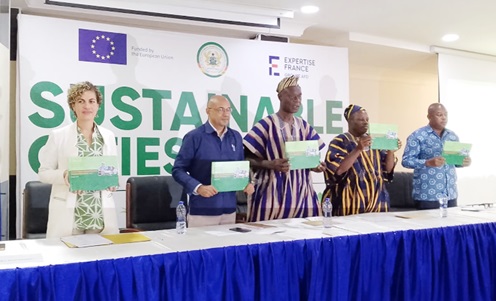A €15 million initiative, aimed at promoting sustainable urban development with a focus on green economic growth, urban resilience, equitable access to basic services and improved local governance, has been launched in Tamale.
Dubbed “Sustainable Cities” Project – Phase 1, the 58-month initiative seeks to enhance national and city-level policies for gender-responsive and integrated urban development.
Additionally, it aims to improve environmental management and strengthen climate change adaptation and mitigation efforts in the regional capitals of northern Ghana.
The project, funded by the European Union (EU), is being implemented by Expertise France under the supervision of the Ministry of Local Government, Decentralisation and Rural Development (MLGDRD).
The project is structured around five key components, each contributing to its overarching goals.
Giving an overview of the project at the launch, the EU Ambassador to Ghana, Irchad Razaaly, indicated that the project sought to develop strong, sustainable and inclusive municipal services to address key issues such as urban solid waste segregation.
Beyond that, he said it would provide essential support to national institutions such as the Ghana Statistical Service (GSS) and the Ghana Water Company Limited (GWL), adding that a national urban observatory system would be established to provide accountability and allow citizens to track the progress of their cities.
Challenges
In a speech read on behalf of the Minister for Local Government, Decentralisation, and Rural Development, Martin Adjei Mensah Korsah, the North East Regional Minister, Yidana Zakaria, indicated that the intervention would go a long way to address the challenges facing the beneficiary cities and facilitate better urban planning.
He said the project represented a significant step towards sustainable and modern development in regions with tremendous growth potential.
He added that the rapid urban expansion in northern Ghana had necessitated urgent intervention to ensure the cities grew in a sustainable, inclusive and climate-resilient manner.
“As a country, we are grappling with critical issues such as urban sprawl, inadequate infrastructure, congestion, poor waste management and water shortages, particularly in informal settlements,” Mr Zakaria said.
He, therefore, urged the beneficiary cities to take ownership of the project and actively work towards its success.


